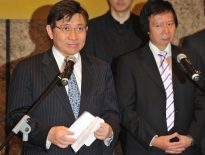(Reuters) – Syrian rebels are smuggling small arms into Syria through a network of land and sea routes involving cargo ships and trucks moving through Turkey, Lebanon and Iraq, maritime intelligence and Free Syrian Army (FSA) officers say.

Western and regional powers deny any suggestion they are involved in gun running. Their interest in the sensitive border region lies rather in screening to ensure powerful weapons such as surface to air missiles do not find their way to Islamist or other militants.
FSA fighters say munitions supply chains remain tenuous. In one clash last week, rebel fighters say they ran out of ammunition which forced them to retreat from one of their strongholds in the northern Idlib province.
The steady trickle of relatively unsophisticated arms making its way to forces opposing President Bashar al-Assad is being financed mainly by wealthy individuals in Saudi Arabia and Qatar, a security source said, as well as from expatriate Syrian supporters.
It complements supplies captured from the Syrian army or brought by defectors.
“There are three gateways from where we are getting weapons and they are not secret – Lebanon, Turkey and Iraq,” an FSA officer in Syria said. “The weapons entering Turkey are by sea and in containers.”
Turkey, which hosts the FSA in the border area and is in the forefront of diplomatic efforts to unseat Assad, says it is not supplying the rebels with weapons, nor allowing passage of arms through its ports or across its territory. However, officials accept a small amount of weaponry is spirited across an almost 900 Km (550 mile) frontier hard to patrol and always prone to smuggling.
The FSA, for its part, would like more powerful arms to attack government armor and defend or extend territory it has, in a change of tactics, begun to seize in recent weeks.
“Of course the weapons we have and we are receiving cannot determine the battle with Assad and finish him. We need more, much more but it helps inflict damage,” the FSA officer said.
Several security and maritime intelligence sources said light arms were being procured especially from the Black Sea region.
“Certainly they are being sourced from the Black Sea area and are coming in by ship,” a maritime intelligence source said. “We are only talking about semi-automatic weapons which are easily, freely and cheaply obtainable. Each one costs only a few hundred dollars.”
A source within the international arms industry said at least one consignment comprising around 2,000 weapons of Russian-pattern Kalashnikov assault rifles and also sniper rifles had been dispatched via Turkey to Syrian rebels in the past few weeks.
“I expect there will be more coming soon from the same places as these arms came from and there are enough (arms) factories around the Black Sea,” the source said. “It’s small arms and light weapons at the moment.”
Arms trackers say Bulgaria, Romania and Ukraine all have stockpiles of Russian-styled light arms that were produced in the countries dating back to the Soviet era when factories were set up with help from Moscow.
“The Syrian army uses primarily Soviet or Warsaw Pact calibers,” said James Bevan of Conflict Armament Research, who tracks weapons for governments and organizations.
“And if you look at any rebel force, they tend to use exactly the same weapons as their opponents because when they capture weapons they can use the same ammunition.”
A former official with Bulgaria’s security sector said the Black Sea was the most realistic route for weapons.
“Because of Bulgaria’s gradual decrease of armed forces, the sell-off of arms equipment and the deposition of ammunition, relatively smooth supplies for such deals can be ensured,” the former official said.
Bulgaria’s foreign ministry said the controls over arms deals were very tight and such shipments were not possible. Sofia, it said, did not export weapons to Syria.
“Our efforts are focused on working with our Arab partners, the EU, the U.S. and Turkey in supporting the opposition in its efforts to develop a credible plan for a free and democratic Syria,” said foreign ministry spokeswoman Vesela Cherneva.
Ukraine’s security service SBU said Kiev had a strong system of control over weapons sales. Romania’s foreign ministry said Bucharest had curbs that would stop deliveries to Syria.
Analysts said despite the controls, Black Sea countries remain viable gateways given the profitability of such trade for private arms dealers and lax scrutiny.
A NATO official said it had “no mandate and no role in intercepting arms consignments of any kind in the Black Sea”.
Assad’s opponents say just under 13,000 armed and unarmed opponents and around 4,300 members of security forces loyal to Damascus have been killed since he launched a crackdown, using tanks and helicopter gunships to attack rebel strongholds inside Syria’s biggest cities.
BY LAND AND BY SEA
Maritime security sources said consignments were most likely to be transported in ships to Turkey for onward dispatch to rebels inside Syria. Ship containers are hard to track and seen throughout the world as a security concern.
Not every port security has scanning facilities to cope with a large turnover of cargo.
The FSA officer said they had also bought assault rifles and grenades from Iraq, which were trucked across the border or carried on donkeys. Equipment also crossed from Lebanon.
Rebels paid about 350,000 Syrian pounds ($4,000) for Katyusha rockets and 100,000 pounds for anti-tank missiles.
“We get LAW (anti-tank missiles) and Katyusha rockets as well as ammunition like bullets and grenades. We buy them from arms dealers – it is easy in Lebanon,” the officer said. “The Jordanians have blocked most of our supplies from there.”
Rebel fighters have said they were also in possession of thousands of Belgian FN FAL assault rifles.
“One of the most dispersed type of assault rifles in the world is the Belgian manufactured FN FAL which dates back to the 1960s. It’s probably quite likely to be old. They have a far greater range than the Kalashnikov-pattern weapons circulating in the region,” said Conflict Armament Research’s Bevan.
Two maritime security sources said they were aware of attempts also being made to procure light arms on behalf of Syrian rebels via private security firms in South Africa.
“What’s being discussed are test runs using surplus arms inside South Africa. We are talking about paper bags full of cash involved. It’s as simple and crude as that and it’s untraceable,” the maritime intelligence source said.
However, one South African defense contractor said the government kept a very close eye on munitions exporters.
“It’s quite normal for South African citizens to be proposing or organizing contracts in the Middle East, but the government would not let arms go either directly or indirectly to a rebel movement,” the contractor said. “No company is going to take the risk because they are going to lose so much.”
A foreign ministry spokesman declined to comment.
BLOWBACK FEARS
U.S. and allied national security officials say they remain dismayed at the rebels’ inability to form a coherent national movement and continue to be dogged by factional rivalries. The U.S. and its allies also fear a growing presence among the rebels of Islamic militants, some of whom Western intelligence officials say may be affiliated with al Qaeda in Iraq.
Nick Pratt, who helped arm and train anti-Soviet guerrillas in Afghanistan for the CIA in the 1980s, said foreign suppliers of an insurgency had to tread cautiously.
“There has to be face to face contact in the field with the people who are going to use these things, to give you some reassurance that the weapons are getting into the right hands,” said Pratt, a retired U.S. Marine Corps colonel.
“What you don’t want to do is go through a third party that takes control of the distribution for you. You may find the supplies end up in places, and with people, you don’t want.”
For the moment, it appears unlikely that either the U.S. or many if any of its allies in Europe are gearing up for a major push to greatly accelerate arms deliveries to Syrian rebels. Nothing on the lines of the support given to rebels in Libya last year is in anywhere in sight.
Graham Cundy, a former UK military officer with experience of special operations, told Reuters: “In situations like Syria, UK government priorities are far more about intelligence gathering and understanding what is going on, than in supplying one group or another. The tribal and communal mix is far more complicated than in Libya.”
“Any intelligence service worth its salt will be hanging around the border areas and getting to know the networks that are supplying the players,” said Cundy, who has counter-terrorism experience in the Middle East as well as other areas.
“They will be monitoring who gets what, because the same networks that supply opposition groups may well be the same networks that supply extremists. You don’t want a SAM-7 missile ending up in the hands of a determined organization with links back to communities in the UK, ” he said.
Iraq said last week it had “solid information” that al Qaeda militants were crossing from Iraq into Syria to carry out attacks in the 16-month-old insurgency.
Western officials say anti-Assad rebels as well as forces marshaled by or supporting the Syrian government have killed civilians, although on balance more atrocities are attributed to the government side. Opposition sources said about 220 Syrians, mostly civilians, were killed in a village in the rebellious Hama region this week, largely by army artillery bombardment
Assad, whose family has ruled Syria for 42 years, has accused Qatar, Saudi Arabia, Turkey and the U.S. of funding “terrorists”. Last week a group of Western and Arab states from the “Friends of Syria” agreed to “massively increase” aid to Syrian rebels and provide them with communications equipment.
“Although the intensity of the conflict is likely to increase over the coming weeks and months – especially as anti-regime forces become better armed – there is little to suggest that either side will be able to gain a decisive victory through the use of force alone in the short term,” said Torbjorn Soltvedt, senior analyst with risk analysis firm Maplecroft.
(Additional reporting by William Maclean and Mark Hosenball in London, Jonathon Burch in Ankara, Jon Herskovitz and Ed Cropley in Johannesburg, Susan Cornwell in Washington, Tsvetelia Tsolova in Sofia, Ioana Patran in Bucharest and Pavel Polityuk in Kiev, writing by Jonathan Saul; editing by Ralph Boulton)





